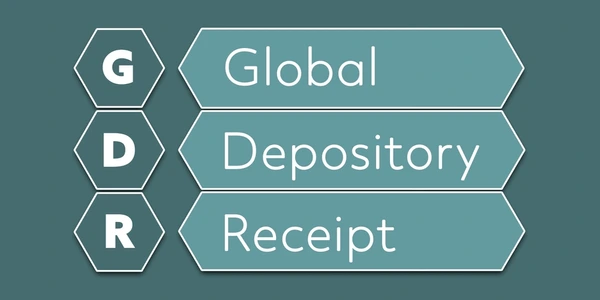A global depositary receipt (GDR) is a negotiable financial instrument issued by a depositary bank. It represents shares in a foreign company and trades on the local stock exchanges in investors’ countries. GDRs make it possible for a company (the issuer) to access investors in capital markets beyond the borders of its own country.

Global Depository Receipts (GDR) Meaning
GDRs are a way for foreign companies to raise capital in foreign markets without having to list their shares on the local stock exchange. Instead, a bank buys the shares of the foreign company and issues GDRs in exchange. The bank holds the underlying shares and issues GDRs representing those shares to investors. GDRs are denominated in a currency such as US dollars and traded on international stock exchanges. This allows investors to invest in foreign companies without having to deal with the complexities of investing in a foreign stock exchange, while also providing companies with access to a broader pool of international investors.
Characteristics of Global Depository Receipts
Here are some key characteristics of Global Depository Receipts (GDRs):
1. Denomination: GDRs are typically denominated in a currency such as US dollars or euros.
2. Issuers: GDRs are issued by banks or financial institutions in foreign countries on behalf of foreign companies that wish to raise capital from international investors.
3. Ownership: GDRs represent ownership in a foreign company. The underlying shares are held by the bank or financial institution that issues the GDRs.
4. Trading: GDRs are traded on international stock exchanges, allowing investors to invest in foreign companies without having to deal with the complexities of investing in a foreign stock exchange.
5. Dividends: GDR holders are entitled to receive dividends and other distributions from the underlying shares.
6. Conversion: GDRs can be converted into the underlying shares at the option of the holder.
7. Regulatory requirements: GDRs are subject to regulatory requirements in the country of issuance and the country where they are traded.
Global depository receipts in the Indian market
The Securities and Exchange Board of India (SEBI) published a comprehensive framework to issue Depository Receipts (DR) in October 2019. The new rules allow easier access to foreign capital through GDRs and ADRs.
The International Financial Services Centre (IFSC) in Gujarat allows Indian companies to list their global receipts to raise funds through foreign sources. They can only offer their shares on overseas exchanges through GDRs. GDRs can be issued by private placement, public offering or any other method acceptable in the relevant jurisdiction, according to the new rules.
Indian companies who want to issue GDRs must get Ministry of Finance and FIPB clearance. Only listed companies can issue GDRs in overseas marketplaces. GDRs allow investors to gain access to international companies’ capital markets without dealing with language, currency or tax restrictions.
An Indian company that wants its shares to be listed on foreign stock exchanges, such as the London and Hong Kong Stock Exchanges, except the US stock exchange, can use a GDR. The Indian company should engage with a foreign depository bank in a depositary receipt agreement. These banks issue shares on their respective stock exchanges based on regulatory compliance in both nations.
Following are a few Indian companies that have issued GDRs:
- UPL is listed on the Singapore Stock Exchange
- Aditya Birla Capital is listed on the Luxembourg Stock Exchange
- GAIL India is listed on the London Stock Exchange
What is GDR in the stock market?
GDRs are negotiable certificates that represent ownership of a specified number of shares of a company issued by depositary banks. They can be traded and listed independently from the underlying shares. Foreign companies can trade in a country’s stock market through GDRs, except the US stock market. Those holding GDRs can surrender them to the bank and convert them into shares.
GDRs are listed on non-US stock exchanges like the Luxembourg or London Stock Exchange. The GDR market is institutional and thus offers low liquidity but allows trading across many significant countries.
GDR is the only way through which Indian companies can make their shares available on various foreign exchanges. Thus, the company can use the issued negotiable certificates to raise funds outside of India by trading the shares on foreign exchanges.
The value of a GDR depends on the value of the underlying share. But, the shares in the foreign country are settled and traded separately from the underlying share. Usually, 1 GDR is equivalent to 10 underlying shares. However, the GDR to the number of shares ratio can differ.
Global Depository Receipts Example- Infosys
In 2013, Infosys issued 30 million GDRs, each representing one share of Infosys, on the Luxembourg Stock Exchange.
The GDRs were issued by JP Morgan Chase Bank, N.A. and represented approximately 2.2% of the company’s outstanding shares. The GDRs were priced at $14.58 per share and raised a total of $438 million.
By issuing GDRs, Infosys was able to raise capital from international investors without having to list its shares on a foreign stock exchange. The GDRs were listed on the Luxembourg Stock Exchange and traded like regular shares, allowing investors to invest in Infosys without the need to navigate the Indian stock market.
The GDRs also provided Infosys with access to a broader pool of international investors and helped to improve liquidity for the company’s shares.
FAQs
What Is the Meaning of Global Depositary Receipt?
A global depositary receipt is a negotiable certificate issued by a bank. The certificate represents shares in a foreign company traded on a local stock exchange. GDRs give companies access to greater capital and investors the opportunity to invest in the equity of foreign companies.
What Are Some Features of GDRs?
GDRs can be listed on multiple global stock exchanges, They also provide investors with the benefits and rights of the underlying shares, which could include dividends. GDRs trade like shares and can be bought and sold throughout the day via a standard brokerage account.
